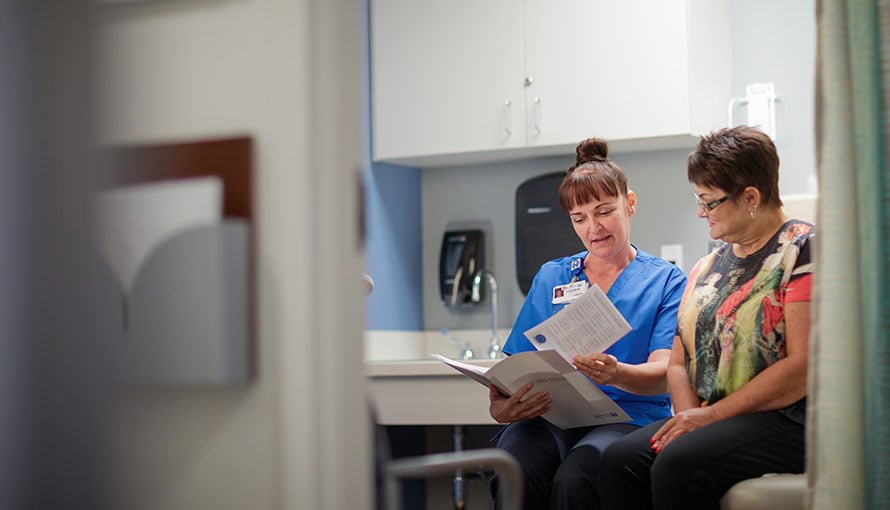Breast Cancer Screening
Breast cancer screening is a vital component of every woman’s healthcare. The process involves periodically checking the breasts for signs of cancer, such as a new breast lump or a mass that can be felt.
Symptomatic breast tumors tend to be larger and more advanced than asymptomatic breast tumors. Therefore, the goal of screening is to detect breast cancer and other abnormalities early, when more treatment options are generally available.
The importance of detecting breast cancer early
Breast cancer is the second most common cancer in women (skin cancer is first). However, when diagnosed in its initial stages, it is also one of the most treatable forms of cancer. For many women, this means less aggressive treatment and an excellent outcome. For these reasons, it is important for every woman to be screened regularly in the manner and at the frequency recommended by her clinical care provider. While there are general guidelines, breast cancer screening recommendations can vary based on a woman’s risk level and other individual factors.
According to many experts, the use of mammograms and other types of screening radiology have reduced breast cancer mortality in the U.S. by nearly 40% since 1990. At Moffitt Cancer Center, we take great pride in our fellowship-trained breast radiologists, who deliver compassionate and comfortable care using the most innovative breast cancer screening technologies available today.
Breast cancer screening tests available at Moffitt
Moffitt offers a full slate of traditional and cutting-edge breast cancer screening options, including:
Mammogram
The current gold standard in breast cancer screening, a mammogram consists of a series of images of the breast captured with low-dose X-rays. A typical screening mammogram consists of two X-ray images of each breast taken from two different angles—top to bottom and side to side. When interpreting the images, a radiologist will look for abnormalities, such as areas of increased density, thickened skin, clusters of calcifications and asymmetries. Because cancerous and noncancerous growths can look the same on a mammogram, any abnormalities are usually followed up with further testing. Mammography is proven to be a highly effective cancer-screening tool.
Digital breast tomosynthesis (DBT)
This specialized type of mammogram consists of multiple images of the breast taken from many different angles. Also referred to as a three-dimensional (3D) mammogram, tomosynthesis can improve breast cancer detection.
Breast magnetic resonance imaging (MRI)
A large magnet and computer-generated radio waves are used to produce detailed images of the breast. When performed along with a mammogram, a breast MRI can increase the likelihood of early detection.

Breast cancer risk assessments
Moffitt is laser-focused on helping our patients overcome cancer at any stage, and that includes providing services that allow high-risk patients to understand their vulnerability and take appropriate action. Because we know that early detection leads to the best possible outcome, we are pleased to offer advanced breast cancer risk assessments, screenings and counseling services.
Moffitt stands out from many other cancer screening providers because we evaluate breast cancer risk factors for every patient who comes to us for screening. This helps us identify women who have an elevated risk of developing breast cancer and could benefit from more intensive screening beyond an annual mammogram.
Why do we do this? Statistics show that 1 in 8 women will develop breast cancer at some point in her lifetime. Yet a recent survey indicated that only 9% of women who receive breast cancer screenings could accurately estimate their risk of developing the disease, and about 40% had never discussed their personal risk level with a healthcare provider. It is imperative that women and their physicians understand the importance of identifying specific risk factors for breast cancer so they can take the most appropriate action to prevent the disease and detect it early.

What breast cancer risk factors do we assess?
When a patient receives a breast cancer screening at Moffitt, our specialists provide an individualized risk assessment and guidance on how to manage the risk. Some of the many breast cancer risk factors we evaluate include:
Family history
Women with close family members who have or had breast cancer face a significantly higher risk of developing the disease themselves. However, women and their healthcare providers tend to overestimate the importance of family history when calculating risk. In fact, the vast majority of women who are diagnosed with breast cancer have no family history of the disease. Moreover, having family members who have or had certain other types of cancer can also increase a woman’s risk for breast cancer.
Age
The risk of developing breast cancer increases with age, with most new cases diagnosed in women 50 and older. However, about 9% of new cases are diagnosed in women younger than 45.
Reproductive history
Women who began menstruating before age 12 and women who entered menopause after age 55 have a higher risk of developing breast cancer. The elevated risk is due to the prolonged exposure to hormones that results from having more menstrual cycles over their lifetime.
Inherited gene mutations
Women who inherited certain mutations in genes such as BRCA1 and BRCA2 are more prone to developing breast cancer.
Breast density
Women whose breasts have more connective tissue than fatty tissue are more likely to develop breast cancer.
Prior radiation, medication or hormone therapy
Women who received radiation therapy to their chest before age 30, took certain medications or used hormone therapy (including certain birth control pills) may have a higher risk of developing breast cancer.
Obesity
Carrying excess body weight—especially after menopause—increases a woman’s risk of developing breast cancer. Other lifestyle factors may further increase the risk.
Genetic testing for breast cancer
Like all malignancies, breast cancer begins with uncontrolled cell growth. The excess cells then build up, bind together and form tumors. Normally, cellular reproduction is tightly controlled by genes, but the process can go awry due to a mutation in one of the breast cancer susceptibility genes (BRCA1 or BRCA2). In most cases, these mutations occur spontaneously for unknown reasons; however, they also run in some families.
Genetic testing for breast cancer involves the use of the BRCA gene test. This blood test uses DNA analysis to identify inherited mutations in the BRCA1 and BRCA2 genes, which increase the risk of both breast cancer and ovarian cancer.
The BRCA gene test is not routinely performed to screen people who are at average risk; however, it may be useful for a patient who is likely to have an inherited gene mutation based on their family cancer history. A positive result indicates that a BRCA1 or BRCA2 gene mutation is present, which increases the risk of cancer. This information is valuable because the patient can then work with their physician to manage their risk.
It is important to note that not everyone who inherits a specific cancer-susceptibility variant will ultimately develop cancer. There are many other factors at play—such as environmental exposures and lifestyle practices—that can influence the development of cancer.

Tiffany remembers learning about the importance of breast self-exams when she was in high school. It was a healthy habit she adopted early. Some 20 years later it saved her life.
Schedule your screening mammogramThe importance of breast cancer screening
Regular screening is vital because it can help detect breast cancer before a lump becomes noticeable. A clinical breast exam is a physical examination of the breasts and underarm area performed by a healthcare provider to detect lumps, masses and other abnormalities. It is still important for women to perform monthly self-exams to help ensure they are familiar with how their breasts normally look and feel. Any lumps or physical changes can then be promptly discussed with a healthcare professional.
A full range of the latest breast cancer screening techniques is available at Moffitt Cancer Center. Our screening services are complemented by diagnostic testing services, advice, treatment and support from a multispecialty group of experts who are experienced in all aspects of cancer care.
If you would like to request an appointment for any type of breast cancer screening at Moffitt, submit a new patient registration form or call 1-888-663-3488 to be connected with a cancer expert as soon as possible.
Helpful Links:
Diagnosis
